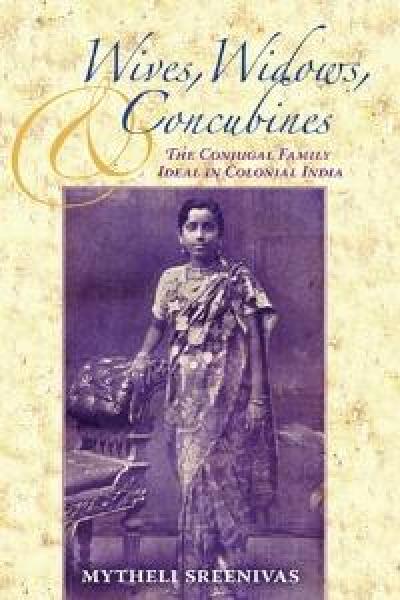Wives, Widows, and Concubines: The Conjugal Family Ideal in Colonial India

Sreenivas, Mytheli
Debates about family, property, and nation in Tamil India
Colonial voices from Wives, Widows, and Concubines:
"The Zemindar used to take his meals with me. The Zemindar used to sleep during nights in the upstairs of the new palace. I and he used to sleep in the same bed." —Menakshi Sundra Nachiar, 1893
"Whenever my husband felt amorous, he would occasionally cohabit with any woman and pay her occasionally. This is all. They were concubines." —Muthuverammal, 1885
"The very principle of the joint family is against giving equal rights to females." —P. C. Tyagaraja Iyer, 1935
"The Zemindar used to take his meals with me. The Zemindar used to sleep during nights in the upstairs of the new palace. I and he used to sleep in the same bed." —Menakshi Sundra Nachiar, 1893
"Whenever my husband felt amorous, he would occasionally cohabit with any woman and pay her occasionally. This is all. They were concubines." —Muthuverammal, 1885
"The very principle of the joint family is against giving equal rights to females." —P. C. Tyagaraja Iyer, 1935
The family was at the center of intense debates about identity, community, and nation in colonial Tamil Nadu, India. Emerging ideas about love, marriage, and desire were linked to caste politics, the colonial economy, and nationalist agitation. In the first detailed historical study of Tamil families in colonial India, Wives, Widows, and Concubines maps changes in the late colonial family in relation to the region's culture, politics, and economy. Among professional and mercantile elites, the conjugal relationship displaced the extended family as the focal point of household dynamics. Conjugality provided a language with which women laid claim to new rights, even as the structures of the conjugal family reinscribed women's oppression inside and outside marriage.
Investigators
Mytheli Sreenivas, Professor of History and Women’s, Gender and Sexuality Studies
Filters: 2008
